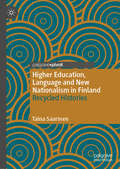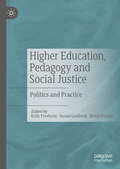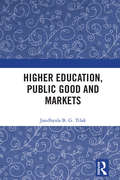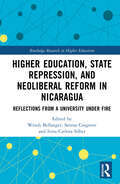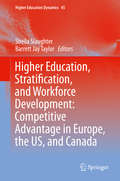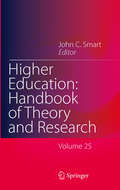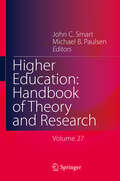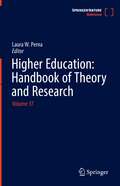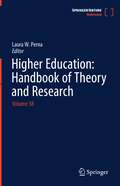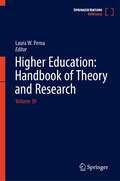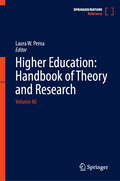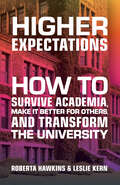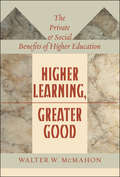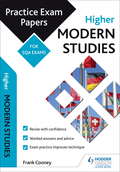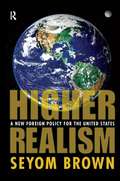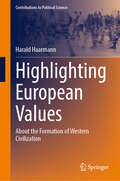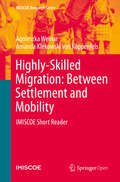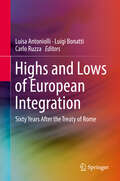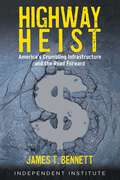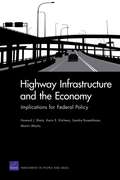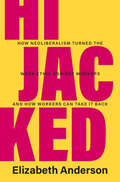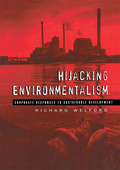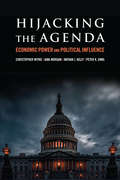- Table View
- List View
Higher Education, Language and New Nationalism in Finland: Recycled Histories
by Taina SaarinenThe book discusses recycled discourses of language and nationalism in Finnish higher education, demonstrating the need to look beyond language in the study of language policies of higher education. It analyses the historical and political layeredness of language policies as well as the intertwined nature of national and international developments in understanding new nationalism. Finnish higher education language policies were fuelled by the dynamics and tensions between the national languages Finnish and Swedish until the 2000s, when English begins to catalyse post nationalist discourses of economy and competitiveness. In the 2010s, English begins to be seen as a threat to Finnish. Educational, economic and epistemic nationalism emerge as the main cycles of new nationalist language policies in Finnish higher education. The book will be of interest to language policy and higher education scholars and practitioners, as well as graduate students language policy and higher education.
Higher Education, Pedagogy and Social Justice: Politics and Practice
by Helen Proctor Susan Goodwin Kelly FreebodyThis book explores how the concepts of social justice, diversity, equity and inclusion can be understood within the context of higher education. While terms such as these are often in common use in universities, they are not always used with clarity and precision. The editors and contributors offer a serious and detailed examination of pressing contemporary concerns around ‘social justice’ across politics, practice and pedagogy in order to encourage hard thinking and practical agenda setting for social-justice oriented research, teaching and community engagement. Drawing upon new theoretical work, research projects and innovative university teaching, this book offers both useful theoretical insights and practical possibilities for action. This collective and collaborative volume will be of interest and value to all those interested in promoting social justice, in particular how it can be promoted within the university setting.
Higher Education, Public Good and Markets
by Jandhyala B. TilakThis book critically examines some of the major trends in the development of higher education. It demonstrates how in the context of liberalisation, globalisation and marketisation, the crisis in higher education has assumed different dimensions in all advanced and emerging societies. The author shows how the state tends to slowly withdraw from the responsibility of higher education, including in the arena of policy-making, or simply adopts a policy of laissez-faire (of non-involvement) which helps in the rapid unbridled growth of private sector in higher education. The notion of higher education as a public good is under serious contestation in current times. The book argues for the need to resurrect the compelling nature of higher education along with its several implications for public policy and planning, while providing a broad portrayal of global developments, comparative perspectives and key lessons. The volume will be of interest to scholars and researchers of education, political science, public policy and administration, governance, development studies, economics, and those working in the higher education sectors, think-tanks, policymakers as well as NGOs.
Higher Education, State Repression, and Neoliberal Reform in Nicaragua: Reflections from a University under Fire (Routledge Research in Higher Education)
by Serena Cosgrove Wendi Bellanger Irina Carlota SilberThis innovative volume makes a key contribution to debates around the role of the university as a space of resistance by highlighting the liberatory practices undertaken to oppose dual pressures of state repression and neoliberal reform at the Universidad Centroamericana (UCA) in Nicaragua. Using a critical ethnographic approach to frame the experiences of faculty and students through vignettes, chapters present contextualized, analytical contributions from students, scholars, and university leaders to draw attention to the activism present within teaching, research, and administration while simultaneously calling attention to critical higher education and international solidarity as crucial means of maintaining academic freedom, university autonomy, oppositional knowledge production, and social outreach in higher education globally. This text will benefit researchers, students, and academics in the fields of higher education, educational policy and politics, and international and comparative education. Those interested in equality and human rights, Central America, and the themes of revolution and protest more broadly will also benefit from this volume.
Higher Education, Stratification, and Workforce Development
by Sheila Slaughter Barrett Jay TaylorThis work analyses how political economic shifts contribute to competition within higher education systems in the US, EU, and Canada. The authors highlight competition for prestige and public and private subsidies, exploring the consequences of these processes through theoretical and empirical analyses. Accordingly, the work highlights topics that will be of interest to a wide range of audiences. Concepts addressed include stratification, privatization of formerly public subsidies, preference for "high tech" academic fields, and the vocationalization of the curriculum (i. e. , Science, Technology, Engineering and Mathematics: [STEM] fields, selected professions, and business) rather than the liberal arts or the Humboldtian vision of the university. Across national contexts and analytic methods, authors analyze the growth of national policies that see universities as a sub set of economic development, casting universities as corporate research laboratories and education as central to job creation. Throughout the volume, the authors make the case that national and regional approaches to politics and markets result in different experiences of consequences of academic capitalism. While these shifts serve the interests of some institutions, others find themselves struggling to meet ever-greater expectations with stagnant or shrinking resource bases.
Higher Education: Handbook of Theory and Research
by John C. SmartPublished annually since 1985, the Handbook series provides a compendium of thorough and integrative literature reviews on a diverse array of topics of interest to the higher education scholarly and policy communities. Each chapter provides a comprehensive review of research findings on a selected topic, critiques the research literature in terms of its conceptual and methodological rigor, and sets forth an agenda for future research intended to advance knowledge on the chosen topic. The Handbook focuses on twelve general areas that encompass the salient dimensions of scholarly and policy inquiries undertaken in the international higher education community. The series is fortunate to have attracted annual contributions from distinguished scholars throughout the world.
Higher Education: Handbook of Theory and Research
by John C. Smart Michael B. PaulsenPublished annually since 1985, the Handbook series provides a compendium of thorough and integrative literature reviews on a diverse array of topics of interest to the higher education scholarly and policy communities. Each chapter provides a comprehensive review of research findings on a selected topic, critiques the research literature in terms of its conceptual and methodological rigor, and sets forth an agenda for future research intended to advance knowledge on the chosen topic. The Handbook focuses on twelve general areas that encompass the salient dimensions of scholarly and policy inquiries undertaken in the international higher education community. The series is fortunate to have attracted annual contributions from distinguished scholars throughout the world.
Higher Education: Volume 37 (Higher Education: Handbook of Theory and Research #37)
by Laura W. PernaPublished annually since 1985, the Handbook series provides a compendium of thorough and integrative literature reviews on a diverse array of topics of interest to the higher education scholarly and policy communities. Each chapter provides a comprehensive review of research findings on a selected topic, critiques the research literature in terms of its conceptual and methodological rigor and sets forth an agenda for future research intended to advance knowledge on the chosen topic. The Handbook focuses on a comprehensive set of central areas of study in higher education that encompasses the salient dimensions of scholarly and policy inquiries undertaken in the international higher education community. Each annual volume contains chapters on current important issues pertaining to college students and faculty, organization and administration, curriculum and instruction, policy, diversity issues, economics and finance, history and philosophy, community colleges, advances in research methodology and other key aspects of higher education administration. The series is fortunate to have attracted annual contributions from distinguished scholars throughout the world.
Higher Education: Volume 38 (Higher Education: Handbook of Theory and Research #38)
by Laura W. PernaPublished annually since 1985, the Handbook series provides a compendium of thorough and integrative literature reviews on a diverse array of topics of interest to the higher education scholarly and policy communities. Each chapter provides a comprehensive review of research findings on a selected topic, critiques the research literature in terms of its conceptual and methodological rigor and sets forth an agenda for future research intended to advance knowledge on the chosen topic. The Handbook focuses on a comprehensive set of central areas of study in higher education that encompasses the salient dimensions of scholarly and policy inquiries undertaken in the international higher education community. Each annual volume contains chapters on current important issues pertaining to college students and faculty, organization and administration, curriculum and instruction, policy, diversity issues, economics and finance, history and philosophy, community colleges, advances in research methodology and other key aspects of higher education administration. The series is fortunate to have attracted annual contributions from distinguished scholars throughout the world.
Higher Education: Volume 39 (Higher Education: Handbook of Theory and Research #39)
by Laura W. PernaPublished annually since 1985, the Handbook series provides a compendium of thorough and integrative literature reviews on a diverse array of topics of interest to the higher education scholarly and policy communities. Each chapter provides a comprehensive review of research findings on a selected topic, critiques the research literature in terms of its conceptual and methodological rigor and sets forth an agenda for future research intended to advance knowledge on the chosen topic. The Handbook focuses on a comprehensive set of central areas of study in higher education that encompasses the salient dimensions of scholarly and policy inquiries undertaken in the international higher education community. Each annual volume contains chapters on current important issues pertaining to college students and faculty, organization and administration, curriculum and instruction, policy, diversity issues, economics and finance, history and philosophy, community colleges, advances in research methodology and other key aspects of higher education administration. The series is fortunate to have attracted annual contributions from distinguished scholars throughout the world.
Higher Education: Volume 40 (Higher Education: Handbook of Theory and Research #40)
by Laura W. PernaPublished annually since 1985, the Handbook series provides a compendium of thorough and integrative literature reviews on a diverse array of topics of interest to the higher education scholarly and policy communities. Each chapter provides a comprehensive review of research findings on a selected topic, critiques the research literature in terms of its conceptual and methodological rigor, and sets forth an agenda for future research intended to advance knowledge on the chosen topic. The Handbook focuses on a comprehensive set of central areas of study in higher education that encompasses the salient dimensions of scholarly and policy inquiries undertaken in the international higher education community. Each annual volume contains chapters on such diverse topics as research on college students and faculty, organization and administration, curriculum and instruction, policy, diversity issues, economics and finance, history and philosophy, community colleges, advances in research methodology, and more. The series is fortunate to have attracted annual contributions from distinguished scholars throughout the world.
Higher Expectations: How to Survive Academia, Make it Better for Others, and Transform the University
by Leslie Kern Roberta HawkinsHigher Expectations is a practical guide to navigating academia for people who want to improve their own day-to-day work lives and create better conditions for everyone. Universities are broken: they’re built on systems that are discriminatory, hierarchical, and individualistic. This hurts the people that work and learn in them and limits the potential for universities to contribute to a better world. But we can raise our expectations. Hawkins and Kern envision a university transformed by collaboration, care, equity, justice, and multiple knowledges. Drawing on real-world, international examples where people and institutions are already doing things in new ways, Higher Expectations offers concrete advice on how to make these transformations real. It covers many areas of academic life including course design, conferencing, administration, research teams, managing workloads and more. Designed for faculty, graduate students, postdoctoral researchers, and other scholars, Higher Expectations delivers hope and practical actions you can take to start making change now. It is a must-have for everyone working in academia today.
Higher Ground: New Hope for the Working Poor and Their Children
by Greg J. Duncan Aletha C. Huston Thomas S. WeisnerDuring the 1990s, growing demands to end chronic welfare dependency culminated in the 1996 federal “welfare-to-work” reforms. But regardless of welfare reform, the United States has always been home to a large population of working poor—people who remain poor even when they work and do not receive welfare. In a concentrated effort to address the problems of the working poor, a coalition of community activists and business leaders in Milwaukee, Wisconsin, launched New Hope, an experimental program that boosted employment among the city’s poor while reducing poverty and improving children’s lives. In Higher Ground, Greg Duncan, Aletha Huston, and Thomas Weisner provide a compelling look at how New Hope can serve as a model for national anti-poverty policies. New Hope was a social contract—not a welfare program—in which participants were required to work a minimum of thirty hours a week in order to be eligible for earnings supplements and health and child care subsidies. All participants had access to career counseling and temporary community service jobs. Drawing on evidence from surveys, public records of employment and earnings, in-depth interviews, and ethnographic observation, Higher Ground tells the story of this ambitious three-year social experiment and evaluates how participants fared relative to a control group. The results were highly encouraging. Poverty rates declined among families that participated in the program. Employment and earnings increased among participants who were not initially working full-time, relative to their counterparts in a control group. For those who had faced just one significant barrier to employment (such as a lack of access to child care or a spotty employment history), these gains lasted years after the program ended. Increased income, combined with New Hope’s subsidies for child care and health care, brought marked improvements to the well-being and development of participants’ children. Enrollment in child care centers increased, and fewer medical needs went unmet. Children performed better in school and exhibited fewer behavioral problems, and gains were particularly dramatic for boys, who are at the greatest risk for poor academic performance and behavioral disorders. As America takes stock of the successes and shortcomings of the Clinton-era welfare reforms, the authors convincingly demonstrate why New Hope could be a model for state and national policies to assist the working poor. Evidence based and insightfully written, Higher Ground illuminates how policymakers can make work pay for families struggling to escape poverty.
Higher Learning, Greater Good: The Private and Social Benefits of Higher Education
by Walter W. McMahonThe chronic underinvestment in higher education has serious ramifications for both individuals and society.Winner, Best Book in Education, 2009 PROSE Awards, Professional and Scholarly Publishing Division, Association of American PublishersWinner, Best Book in Education, PROSE Awards, Professional and Scholarly Publishing Division, Association of American PublishersA college education has long been acknowledged as essential for both personal success and economic growth. But the measurable value of its nonmonetary benefits has until now been poorly understood. In Higher Learning, Greater Good, leading education economist Walter W. McMahon carefully describes these benefits and suggests that higher education accrues significant social and private benefits. McMahon's research uncovers a major skill deficit and college premium in the United States and other OECD countries due to technical change and globalization, which, according to a new preface to the 2017 edition, continues unabated. A college degree brings better job opportunities, higher earnings, and even improved health and longevity. Higher education also promotes democracy and sustainable growth and contributes to reduced crime and lower state welfare and prison costs. These social benefits are substantial in relation to the costs of a college education. Offering a human capital perspective on these and other higher education policy issues, McMahon suggests that poor understanding of the value of nonmarket benefits leads to private underinvestment. He offers policy options that can enable state and federal governments to increase investment in higher education.
Higher Modern Studies: Practice Papers for SQA Exams
by Frank CooneyPractise for your SQA exams with three specially-commissioned Hodder Gibson Practice Exam Papers.- Practise with model papers written and checked by experienced markers and examiners- Get extra advice with specially-written study-skills guidance sections- Gain vital extra marks and avoid common mistakes with examiner tips
Higher Realism: A New Foreign Policy for the United States
by Seyom BrownFor dealing with an increasingly chaotic and violence-prone world, Higher Realism offers a grand strategy that rejects the imperial thrust of recent U.S. foreign policy as well as the conventional "realist" approach of focusing only on U.S. interests. The emerging world order is one in which many powers of various sorts-states and nonstate actors, large and small, allies and adversaries-have an essential role. Seyom Brown calls this the emergent international "polyarchy," and argues that neither the assertive interventionism of the neoconservatives nor the cool, nonideological geopolitics of the conventional realists is the appropriate response. Instead, responsive to how U.S. interests have become inextricably bound up with world interests, Brown proposes a foreign policy of higher realism centered on cooperation to ensure the security and well-being of all. Brown defines and analyzes those common interests in the environment, peace and security, health and economic vitality, human rights and democracy, and transnational accountability. He faults the arrogant assumption that what is good for the United States is ipso facto good for the world, insisting rather that U.S. policies for global development must respect religious and cultural diversity. Brown's approach transcends the traditional dichotomies of realism versus idealism and self-interest versus altruistic morality. The recommended programs and policies are designed to help a new U.S. presidential administration reformulate a foreign policy that will ensure national security and promote international well-being: higher realism in philosophy and practice.
Highgrove: A Garden Celebrated
by HRH The Prince of Wales Bunny GuinnessHIGHGROVE: A GARDEN CELEBRATED is a commemoration of the beautiful, mature gardens planned and planted by The Prince of Wales over thirty years ago. The gardens at Highgrove evoke intense emotion. In January, the dramatic light and early snowdrops of the Stumpery are exquisite; the glistening emerald lawns and tree blossoms in Spring lift the spirits with a promise of what is to come; in Summer, the longed-for delphiniums in the Sundial Garden stand proudly to attention and dramatic leaf colours welcome Autumn to the Arboretum as the harvesting in the Kitchen Garden begins. In Winter the structural elements of the garden have their moment of glory as the year comes to a close and the cycle of the seasons continues.Lavishly illustrated with photographs that capture both the light and detail of this magisterial space, this beautiful book will delight and inspire gardeners of every level. It is an exquisite celebration of garden design, passion and inspiration.
Highlighting European Values: About the Formation of Western Civilization (Contributions to Political Science)
by Harald HaarmannThis book sheds light on the achievements of the Old European civilization, also known as the Danube civilization, which flourished between 6000 and 3000 BCE. Contrary to popular belief, many elements attributed to Greek origins stem from this pre-Greek culture. Modern research reveals that ancient civilizations developed along two distinct paths: communitarian administration without social hierarchy, as seen in the Danube and Indus civilizations, and state models with hierarchical structures, exemplified by Sumerian and Egyptian cultures. This book highlights how the values and innovations of Old Europe laid the foundation for Greek civilization and, subsequently, Western civilization. By exploring these roots, the study provides modern Europeans with a deeper understanding of their heritage and the diverse origins of their cultural values. The book will appeal to scholars, researchers, and students of political science, history, cultural studies, and anthropology, as well as to everyone interested in a better understanding of European heritage, its values, and the Danube civilization.
Highly-Skilled Migration: IMISCOE Short Reader (IMISCOE Research Series)
by Agnieszka Weinar Amanda Klekowski von KoppenfelsThis open access short reader discusses the emerging patterns of sedentary migration versus mobility of the highly-skilled thereby providing a comprehensive overview of the recent literature on highly-skilled migration. Highly-skilled migrations are arguably the only non-controversial migrant category in political and public discourse. The common perception is that highly-skilled migrants are high-earners with top educational skills and that they are easy to integrate. These perceptions make them a “wanted” migrant. There seems to be however a big divide between the popular perceptions of this migration and its realities uncovered in social research. This publication closes this divide by delving deeper in the variety of experiences, discourses and realities of highly skilled migrants, thereby uncovering the inherent divides between the highly skilled migrants from the North and the South. The reader shows that these divides are constructed realities, shaped by the state policies and underpinned by social imaginary. Written in an accessible language this reader is a perfect read for academics, students and policy makers and all those unfamiliar with the topic.
Highs and Lows of European Integration: Sixty Years After The Treaty Of Rome
by Carlo Ruzza Luisa Antoniolli Luigi BonattiIn light of Europe’s prolonged state of crisis, this book reassesses the challenges and prospects of the European integration process. Scholars from diverse disciplines reflect on various types of integration by analyzing political, economic and sociological variables, while also taking legal and cultural constraints into account. Readers will learn about the dilemmas and challenges of the European transformation process as well as political reforms to overcome these challenges. The book is divided into four parts, the first of which discusses the external dimension of the European Union, including a review of development aid policies and EU foreign policy. In turn, the second part focuses on institutional change and asymmetrical integration in the EU. The third part is devoted to the rise of populism and nationalism, including an analysis of the role of civil society organizations in the Brexit. In closing, the last part highlights the crisis of the Euro as a symbol of European integration and the emerging social and economic divide between countries of the North and South.
Highway Heist: America's Crumbling Infrastructure and the Road Forward
by James T. BennettIn this eye-opening book, Professor James Bennett guides readers through centuries of one of the most underrated yet widely used aspects of American life—roads.Relying on history and economic data—and with a humorous and oftentimes sharp tongue—Bennett explains how important America's highways and byways have been to everything from policymaking to everyday life. Crafting America's roads took persuasion, planning—and more taxes than any politician could have dreamed of. And far too often their realization, thanks, in Bennett's view, to flawed interpretations of the power of eminent domain, required destruction, sometimes on a massive scale, of long-established neighborhoods and important cityscapes. Likewise, the upkeep of America's highways has been the center of many a policy battle, waged by Republicans and Democrats alike. Yes, we all want roads in good working condition—but just how and who will pay for them remain contentious questions. Bennett argues persuasively that the road forward just might be a second, but more serious, sustained look at, and local experimentation with, private roads and toll roads.Agree or disagree with him, Bennett has written a significant contribution to America's ongoing debate about how her citizens should traverse, from "sea to shining sea," its fruited plain.
Highway Infrastructure and the Economy: Implications for Federal Policy
by Howard J. Shatz Martin Wachs Sandra Rosenbloom Karin E. KitchensTo inform debate on a new transportation bill being considered, the authors review the literature on the economic outcomes of highway infrastructure spending, which constitutes the largest share of federal spending on transportation infrastructure. They highlight the connections between highway spending and the economy and then analyze the literature to trace the effects of highway infrastructure on productivity, output, and employment.
Hijacked: How Neoliberalism Turned the Work Ethic against Workers and How Workers Can Take It Back
by Elizabeth AndersonWhat is the work ethic? Does it justify policies that promote the wealth and power of the One Percent at workers' expense? Or does it advance policies that promote workers' dignity and standing? Hijacked explores how the history of political economy has been a contest between these two ideas about whom the work ethic is supposed to serve. Today's neoliberal ideology deploys the work ethic on behalf of the One Percent. However, workers and their advocates have long used the work ethic on behalf of ordinary people. By exposing the ideological roots of contemporary neoliberalism as a perversion of the seventeenth-century Protestant work ethic, Elizabeth Anderson shows how we can reclaim the original goals of the work ethic, and uplift ourselves again. Hijacked persuasively and powerfully demonstrates how ideas inspired by the work ethic informed debates among leading political economists of the past, and how these ideas can help us today.
Hijacking Environmentalism: Corporate Responses to Sustainable Development
by Richard WelfordThis text demonstrates how businesses and institutions continue to operate outside the ecological carrying capacity of the environment, and highlights the need for participation and social innovation on their part. It asserts that senior executives and middle management in large corporations have often sought, deliberately or unconsciously, to block the advancement of environmentalism. Industry has reconstructed the more radical environmental agenda to suit its own purposes, in effect hijacking it, by taking it out of its traditional discourse and placing it in a liberal-productivist framework. The book concludes by examining the way forward for more sustainable business, presenting new models that place greater emphasis on issues such as equity and ethics.
Hijacking the Agenda: Economic Power and Political Influence
by Peter K. Enns Nathan J. Kelly Christopher Witko Jana MorganWhy are the economic interests and priorities of lower- and middle-class Americans so often ignored by the U.S. Congress, while the economic interests of the wealthiest are prioritized, often resulting in policies favorable to their interests? In Hijacking the Agenda, political scientists Christopher Witko, Jana Morgan, Nathan J. Kelly, and Peter K. Enns examine why Congress privileges the concerns of businesses and the wealthy over those of average Americans. They go beyond demonstrating that such economic bias exists to illuminate precisely how and why economic policy is so often skewed in favor of the rich. The authors analyze over 20 years of floor speeches by several hundred members of Congress to examine the influence of campaign contributions on how the national economic agenda is set in Congress. They find that legislators who received more money from business and professional associations were more likely to discuss the deficit and other upper-class priorities, while those who received more money from unions were more likely to discuss issues important to lower- and middle-class constituents, such as economic inequality and wages. This attention imbalance matters because issues discussed in Congress receive more direct legislative action, such as bill introductions and committee hearings. While unions use campaign contributions to push back against wealthy interests, spending by the wealthy dwarfs that of unions. The authors use case studies analyzing financial regulation and the minimum wage to demonstrate how the financial influence of the wealthy enables them to advance their economic agenda. In each case, the authors examine the balance of structural power, or the power that comes from a person or company’s position in the economy, and kinetic power, the power that comes from the ability to mobilize organizational and financial resources in the policy process. The authors show how big business uses its structural power and resources to effect policy change in Congress, as when the financial industry sought deregulation in the late 1990s, resulting in the passage of a bill eviscerating New Deal financial regulations. Likewise, when business interests want to preserve the policy status quo, it uses its power to keep issues off of the agenda, as when inflation eats into the minimum wage and its declining purchasing power leaves low-wage workers in poverty. Although groups representing lower- and middle-class interests, particularly unions, can use their resources to shape policy responses if conditions are right, they lack structural power and suffer significant resource disadvantages. As a result, wealthy interests have the upper hand in shaping the policy process, simply due to their pivotal position in the economy and the resulting perception that policies beneficial to business are beneficial for everyone. Hijacking the Agenda is an illuminating account of the way economic power operates through the congressional agenda and policy process to privilege the interests of the wealthy and marks a major step forward in our understanding of the politics of inequality.
